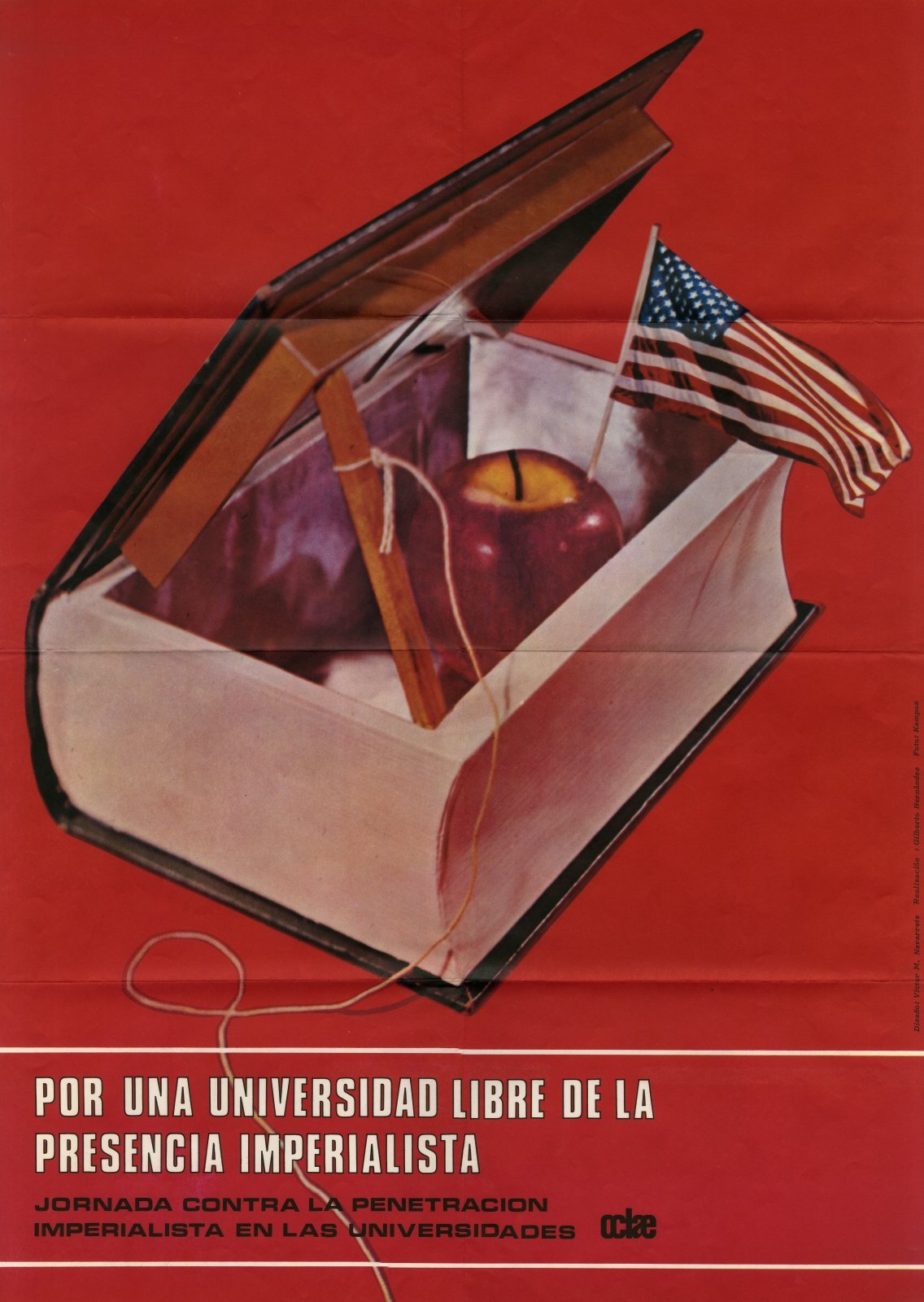Por una universidad libre de la presencia imperialista
Senate House Library Latin American Political Pamphlet Collection
BY ROSA DE KORTE
Por una universidad libre de la presencia imperialista
For a university free from imperialist presence
Death to the oppressive regime of imperialist education! – that seems to be the central message transmitted from this political poster distributed by the Organización Continental Latinoamericana y Caribeña de Estudiantes // Continental Latin American and Caribbean Student Organization (OCLAE).
Still active today and followable on Instagram (@oclae_oficial), OCLAE was formed in 1966 and is at its roots a platform for student voices. Put simply, OCLAE are defenders of – and advocates for – freedom and democracy in education. Increasing literacy rates and access to free education, decolonising curriculums and hierarchies, as well as establishing a foundation of solidarity between autonomous student bodies are some of the ways they work indefinitely towards these goals.
Likely produced in late-sixties Cuba, where the OCLAE was originally founded, this poster visually represents their mission, honing in on the student-led effort to eradicate imperialism from Latin American curriculums. Against a red evocative of communist iconography sits what appears to be a book, which is propped open to resemble a half-open coffin. Inside the book, there is an apple which has the United State’s flag planted in it. The significance of the flag can be easily deduced as the ‘presencia imperialista’ (‘imperialist presence’), and may even remind you of the moon landing. But what should we make of the apple?
Perhaps you are familiar with the old American phrase “apple polisher”, referring to someone who bootlicks their superior, usually a teacher. This was primarily used between the sixteenth and eighteenth centuries along the American Frontier, where students and their parents would gift (often live-in) teachers an apple as payment for their hard work. Symbolically, we can also trace the biblical associations of the apple back to the fruit of knowledge, originating from creation stories of Adam and Eve. Fidel Castro, leader of Cuba from 1959 to 2008, maintained Cuba as an atheist state throughout his years in power, weakening the Vatican’s influence in the country. So, it is certainly not far-fetched to consider this icon as a nod to not only imperialist forces, as explicitly stated, but with it, religious ones too.
Now think about how the string is trailing off towards the viewer. These posters would have likely been put up across Latin American and Caribbean countries through national members of OCLAE, who would have displayed them in universities, street corners, and other public spaces. State-sponsored posters were distinct in style and often had the function of educating the masses. They did this through visual media as well as short, ideologically fused taglines, to communicate the 1959’s founding revolutionary goals, such as eradicating illiteracy in the country. So, if the viewer were to pull the string, the coffin would fall shut, trapping the imperialist fruit of knowledge inside and closing this chapter of US influence in Latin American education systems. This implication of the viewer empowers them in their struggles towards independence.
Reading so deeply into the symbols may not be imperative but the poster undoubtedly has a general sense of immediacy, inviting viewer participation. What remains in this archival material is a lingering feeling of struggle against structures that can and must be challenged by those it fails to serve.
I am certain that you, a participant of our exhibition, have been affected in some way, shape, or form by the wave of industrial strike action in recent months and years here in the UK. In this context, the poster’s ability to empower everyday struggles and the peoples’ ability to shape their future becomes increasingly relevant. In looking at the multitudes of ways in which Latin American student bodies collectivised this struggle for change in the past, we can uncover ideas, both big and small, with the potential to inspire us in the present.
